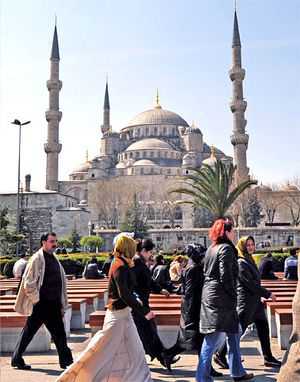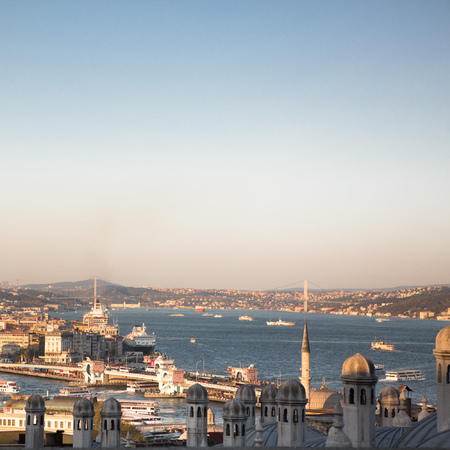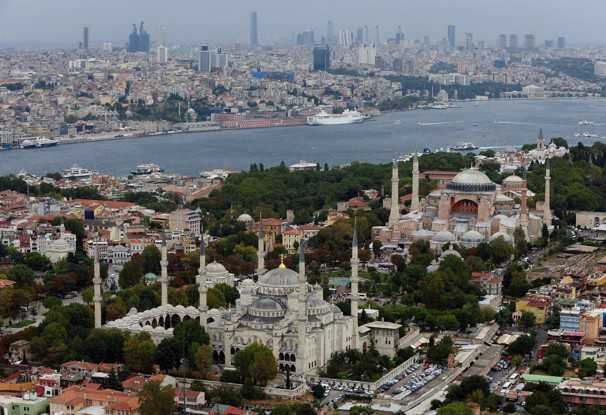Kalypso Nicolaïdis
Hakan Altinay
Many Turkish secularists are becoming ever more critical of the European Union. They should think again, say a group of prominent intellectuals led by Hakan Altinay & Kalypso Nicolaidis: for there are seven ways in which Europe can still be an agent of Turkey’s secularist progress.
3 – 09 – 2008
The question of whether European Union officialdom has taken sides in the ongoing clash between “secularists” and “Islamists” in Turkey is of profound current concern. Many in the first camp seem to believe so, citing as evidence the way that one EU representative after another dismissed the grounds of the indictment denouncing Turkey’s ruling Adalet ve Kalkinma Partisi (Justice & Development Party / AKP) as the “focal point for anti-secular activities.” Europe seems to have become, according to some of these secularists, the great co-conspirator in Turkey against secularism – the very European value the founders of the Republic sought so passionately to affirm.
Indeed, the EU has not found a productive body-language when engaging with those Turks who attach exceptional value to secularism. Many secularists suspect that the post-9/11 west is eager to appease radicalism in the Islamic world, and therefore lowers its standards for a friendly but Islamist partner. The EU’s talk about democracy and the rule of law rings hollow to some of those “on the ground”: what EU politicians really mean, they fear, is that an Islamic democracy is good enough for Turkey. How condescending!
The secularist critique of the European Union approach continues by arguing that Euro-talk of tolerance is all very well in relation to European societies where the relationship between the state and the dominant (Christian) religion has been secularised for one or two centuries and where Islam and the specific issues it raises are contained in small minorities. In such settings, say the secularists, to be relaxed about women wearing headscarfs (for example) may be an affordable luxury – but in Turkey, giving in on this issue amounts to giving up on secularism altogether.
The effect of this trenchant case is that there is now the risk of a divorce in Turkey between the once-western elite and the European project. This is regrettable – for those Turks who care deeply about secularism are critical stakeholders in Turkey, and something remains missing as long as they are not included in the European Union convergence process.
This is not just the EU’s fault. Turkish secularists – allowing for a degree of generalisation to make a larger point – have become rather reclusive. They shy away from European forums. In their increasingly rare contacts with senior Europeans, they have a tendency to hold their counterparts elsewhere responsible for most of the ills in the world, and prefer to lecture rather than to engage with them. Some of their tactics also leave much to be desired: for example, they failed to condemn the Turkish military’s “e-ultimatum” in April 2007, possibly because they have come to believe that democratic principles can give way to their secular ideals. They also have a tendency to seek the most dramatic responses even to mild pressures.
In turn, the allergic reaction by the Europeans to the choice of tactics by the secularists gets in the way of a productive exchange about the real substance of the latter’s concerns. The European Union (and especially European social democrats, who are so much the secularists’ natural allies) need to find a way to decouple the tactics currently pursued by some Turkish secularists (many of which are unsavoury) and their concerns (many of which are legitimate).
When stakes and emotions are high, it helps to get back to basics. It could be argued that the normal apparatus of the EU itself – that is EU laws and EU institutions – has little to do with managing secularism in individual states, whether members or candidates. The choices made within individual countries regarding morality and the organisation of state-society relations are – in the spirit of subsidiarity – the product of complex historical patterns, and best left to each polity. At the same time, the EU is also simply a sum of states and peoples who interact in all sorts of ways, while each (like Turkey) is struggling to reinvent the social contract that binds its citizens, including on the role of religion in their public space.
Paths of progress
It is in this latter sense that the European Union is most relevant to Turkish debates. If both sides can manage to see past political rhetoric and engage on substance, there emerge seven vital ways in which the European Union would ultimately strengthen secularism in Turkey:
1. Modernisation Few doubt that modernisation helps sustain secularism. The progressive integration of Turkey into the European Union would mean a deepening of Turkish modernisation. The Turkish economy will inevitably be further rationalised, and deliver increasing prosperity; there is a time-tested 1% annual catch-up between old member-states and new ones. Spain’s convergence with the European median income is a solid testimony to this effect.
Turkish universities are already integrating into the European space through the Erasmus and other (for example the Framework 6-7) programmes. Such developments in turn will deepen what is referred to as “social differentiation”, including through a greater role for professionals. These are all ingredients of a transformation of the kind mapped by the great German sociologist Max Weber, which has social secularisation at its core.
2. Socialisation The European Union creates socialisation across countries and societies through numerous governmental, administrative, and business- cooperation networks, as well as transnational consultation and decision mechanisms. The civil societies of its different countries increasingly come into contact – in the form of students, trades unionists or NGOs, for example. The more these individuals become linked to several overlapping and layered communities, the less they are bound to their local religious authority.
Increased “life-chances” through multiple belongings tend to free people from traditional conceptions of life. Greece’s once-insular and tradition-bound culture was slowly transformed through waves of Greeks participating in European networks. The progressive integration of Turkey into European socio-political processes will inevitably change its political culture – away from any Islamist instinct.
3. Women The status of women is clearly at the heart of the secular vision. To be sure, modernisation’s call for the remapping of private-public boundaries is meant to release women from the yoke of tradition, including religion. It is not clear, however, that top-down state feminism can be relied on to do all the work here. The key remains equality of access to the workplace.
The European Union’s “Lisbon strategy” – referring here to the union’s economic plans, not its constitutional document – demands 60% female employment, with a vast majority of these women working in industry and services. The growth of female participation in the labour-force will have secularising effects through socialisation. Women, once provided with these opportunities, are unlikely to accept any intrusive controls over their choices – whether from Brussels, from their own state or from the internal restrictions imposed by male-dominated religious authorities.
4. Anti-discrimination Secularists are concerned about creeping Islamisation through the state’s own highly effective power of patronage. To counter this, the European Union has multiple anti-discrimination standards, some of which put the onus of demonstrating non-discrimination on public authorities at the local, national and European levels. There is also an ombudsman office at the EU level who intervenes after receiving complaints of discrimination from individual citizens. A comparable office – resembling a “secularism ombudsman”, a proposal already offered by Turkish political scientists and Olli Rehn, the EU’s enlargement commissioner – could provide effective recourse.
5. Competition Secularists have expressed concern about the creation of pro-government business circles through the selective granting of contracts and licenses. European Union rules on public procurement and state aid can provide effective safeguards in this area. Anti-competitive behaviour on the part of EU governments is punished through requirement to reverse awards or contracts as well as through fines. The EU also has time-tested rules on independent authorities and distribution of licenses and public concessions, which create far larger rents in today’s economy.
Among the many articles in openDemocracy‘s “The future of Turkey” debate:
6. Trans-european politics The European Union does not override the specificities attached to domestic politics; but it is giving rise to a new kind of trans-European politics by connecting the public spheres of its member- states. The national political parties of these member-states create transnational alliances and campaign together for the European parliament, negotiate common platforms and sharing ideas. For Turkey, this would mean inter alia the integration of the AKP or other centre-right parties into the conservative Christian-democratic culture which (with many variants) has internalised the core tenets of secularism.
7. The “democratic core” The various European Union treaties since 1997 include a mechanism for multilateral democratic surveillance to prevent authoritarian “drift” within a member-state. This approach was informally introduced on the occasion of the formation of an Austrian government coalition that included Jörg Haider’s Freiheitliche Partei Österreichs (Freedom Party of Austria / FPÖ). The use of sanctions, while controversial, was “constitutionalised” with the Nice treaty in 2000. It would thus not be far-fetched to argue that if an Islamist government of an Iranian type did come to power in Turkey, it would incur a treatment worse than Haider; assuming that Turkey is ever-more integrated into Europe, the costs would be prohibitive.
More generally, the EU can be thought of as a complex check-and-balance machine, bent on constraining movement towards the “tyranny of the majority” both at the EU level (where small states have a disproportional voice, and decisions are never taken by a simple majority of the population) and within its member-states.
These seven points reinforce the case that convergence and integration with the European Union is clearly a plus for the future of secularism in Turkey. There are two caveats, however.
Convergence without accession?
First, even if most secularists in Turkey do accept these arguments, and do believe in the modernising promise emanating from the EU, the sceptics can still say with some justice that the manner in which EU integration would strengthen secularism in Turkey is made uncertain by the fact that the prospect of Turkey’s actual accession to the EU recedes by the day. Indeed, they say, the likely result in Turkey is the worst of all worlds: paying the price of convergence by opening the (liberal) gates to conservative influences in the country, without acquiring the protective effects of EU membership down the road.
It is certainly true that the failure of the twenty-six other heads of state and/or government to reprimand the French government’s discourse on Turkish membership raises doubts about whether pacta sunt servanda means anything in contemporary Europe. The EU has always maintained a tricky balance between grand vision and petty politicking, and the former is now in short supply; but this is bound to change as Turkey continues to converge with EU member-states, even prior to accession.
In the meantime, Turkey and Turkish secularists have friends – and many more potential friends – in Europe. Moreover, they should stop listening only to, and publicising the words of, their EU enemies. If they really want EU membership, they need to engage with their friends and work towards this goal, instead of resigning prematurely. A European liberal democracy with all the safeguards; a growing economy; European-standard universities; and women’s participation in public life – all this is sure to consolidate secularism in Turkey better than any authoritarian option.
Liberalism vs secularism?
The second and more difficult caveat to this European Union/stronger-secularism equation involves a return to first principles. A convergence to European secularism today requires engaging with a new phase of modernity with political (as opposed to economic) liberalism at its core. Indeed, secularism is a highly contested and amorphous notion, and not only in Turkey – many countries, France and Britain among them, are seized by regular convulsions onver the issue.
Turkey is thus not alone – and our debates must debate each other. In trying to agree on its contours, all European peoples are painfully exploring the various ways they might reconcile the requirement of social integration with the radical pluralism of their societies. Whether in the Netherlands, Britain, France or Austria, secularism is increasingly embedded in liberal imperatives: to commit to the belief that the primary purpose of liberal society is to free its citizens from the fears that have characterised so much of state-society relations up to date, and to empower the autonomy of the individual against the state and the society. The productive thing to do for Turkish secularists would be to join this debate.
But how should the assertion at the core of the secular principle be judged – namely, that the state (especially governmental practices or institutions) should exist separately from religion or religious belief? Does this mean that public servants should be banned themselves from displaying their religious belonging; does it encompass such display by anyone in the public space in general; and if the latter, does the injunction concern only minors or also freely consenting adults?
The rest of Europe considers that outlawing a headscarf worn by an adult is simply outside the range of secularist injunctions if the adult is a consumer of public services (such as education); if she is a provider of such services however, the debate is alive and well. Europeans know all about the clash between tolerance for religious beliefs and tolerance for difference tout court.
Liberalism does not necessarily have a good press among the secular Turkish elite who believe that Turkey would not even be close to EU membership if it had not been for the uncompromising zeal of the young Turks who built the country’s secular pillars on the ashes of the Ottoman empire. Nevertheless, Turkey does not stand outside the liberalism-and-secularism debates that have engulfed the rest of Europe. Turkish seculars have to confront the fact that in 21st-century Europe, those passionately attached to both secular and liberal principles usually argue that when it comes to adults (a crucial reservation), free choice is a more likely path to women’s liberation than a politics of enforced dress.
A question of recognition
In this whole debate, the greatest challenge may be that of true mutual recognition. If the divide in Turkey is between Muslims (pious and secular), what does this mean for Turkey’s engagement with the many Europeans who espouse an ideological brand of secularism, which is not about procedures and rules but about the promotion of an atheist belief-system and the creation of the societal conditions for the spread of such beliefs?
It may not be sustainable to maintain a schizophrenic attitude to the encounter with “the European” – the common idea (in Turkey as well as elsewhere) that the material civilisation of Europe is there for the taking but not the spiritual (including its tolerance for blasphemy). Indeed, both the contemporary anxieties around aggressive secularism and the revival of religion as a global phenomenon must be acknowledged.
It is within Europe that Turkey is best placed to navigate a middle-ground between the two, and demonstrate its capacity to reinvent a brand of secularism that is sustainable in the 21st century. In the end, as we and countless others have repeatedly argued, the success of the European political project and further reforms in Turkey are intimately linked. We invite the Turks and other Europeans to genuinely care for each other’s respective core concerns, desires and historical perspectives, especially when what is at stake is our capacity to share in the reinvention of our societies in a spirit of profound mutual understanding.
This document is endorsed by the following:
Hakan Altinay, Open Society Institute, Istanbul
Jean-Francois Bayard, CERI, Paris
Ivan Krastev, Centre for Liberal Strategies, Sofia
Kalypso Nicolaidis, Oxford University, Oxford
Nathalie Tocci, Instituto Affari Internazionali, Rome
Jose Ignacio Torreblanca, ECFR, Madrid
Raimo Vayrynen, Finnish Institute of International Affairs, Helsinki
Fred Halliday, “Turkey and the hypocrisies of Europe” (16 December 2004)
Murat Belge, “The trials of free speech in Turkey” (6 February 2006)
Daria Vaisman, “Turkey’s restriction, Europe’s problem” (29 September 2006)
John Palmer, “A commonwealth for Europe” (11 October 2006)
Fadi Hakura, “Europe and Turkey: sour romance or rugby match?” (13 November 2006)
Katinka Barysch, “Turkey and the European Union: don’t despair” (27 November 2006)
Hratch Tchilingirian, “Hrant Dink and Armenians in Turkey” (23 February 2007)
Gunes Murat Tezcur, “Turkey divided: politics, faith and democracy” (4 May 2007)
Taner Akcam, “Turkey and history: shoot the messenger” (16 August 2007)
Soner Cagaptay, “Turkey and the Kurds: everybody’s problem” (5 November 2007)
Gunes Murat Tezcur, “Turkey after Hrant Dink” (18 January 2008)
Hasan Turunc, ” Turkey and the Kurds: politics and military action” (27 February 2008)
Mustafa Akyol, ” Turkey’s ‘Islamic reform’: roots and reality” (4 March 2008)
Katinka Barysch, ” Turkey: the constitutional frontline” (14 April 2008)
Cem Özdemir, ” Turkey’s clash of values: memo to Europe” (29 April 2008)
Bill Park, ” Ergenekon: Turkey’s ‘deep state’ in the light” (7 August 2008)






